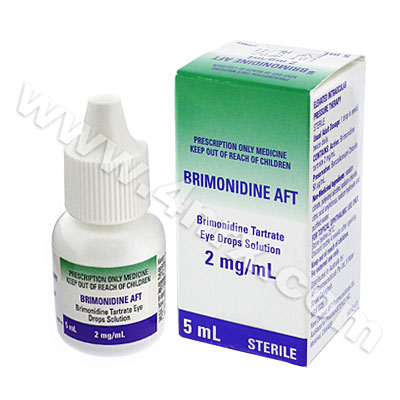 |
Home  Eyes Eyes  Brimonidine Eye Drops (Brimonidine Tartrate) Brimonidine Eye Drops (Brimonidine Tartrate) |
|
|||||||||
|
Brimonidine Eye Drops (Brimonidine Tartrate)
What is Brimonidine Eye Drops (Brimonidine Tartrate) used for? Brimonidine Eye Drops (Brimonidine Tartrate) are given as a treatment to patients suffering from open-angle glaucoma. This medication is a type of alpha agonist, which works by reducing pressure within the eye, thereby reducing the risk of blindness or other vision problems. How should I use Brimonidine Eye Drops (Brimonidine Tartrate)? Patients using Brimonidine Eye Drops (Brimonidine Tartrate) to treat glaucoma should apply this medication directly to the eye. It is important to remove contact lenses if you are wearing them. First, tilt your head back, and form a pouch with the lower eyelid by pulling it out. You may then apply one drop to the affected eye. To stop the eye drops from dripping out, you can close your eye, and gently press the corner of the eye, near to your nose, for 1 to 2 minutes. What are the side effects of Brimonidine Eye Drops (Brimonidine Tartrate)? Brimonidine Eye Drops (Brimonidine Tartrate) have been known to cause some side effects, such as:
Patients should be aware that it is necessary to consult a physician if any of the above mentioned side effects persist or worsen, or if any other more serious side effects occur, such as a rapid heartbeat, burning or inflammation of the eye, severe light sensitivity, a persistent headache, fainting or a slow heartbeat. Please Note Strictly follow all instructions provided to you by your physician or pharmacist while using Brimonidine Eye Drops (Brimonidine Tartrate). Optimum and safe dosage can differ based on the patient and the condition being treated. As this medication may be unsafe for certain patients, it is essential you always inform your physician if you are pregnant or breastfeeding, as well as if you have any allergies, other illnesses, or ongoing health conditions, and if you are taking any other form of medication, supplements, or herbal products. Immediately seek emergency medical care if you have any allergic or hypersensitive reaction. Common signs of a reaction include hives, swelling, skin rashes, chest pains, as well as trouble breathing or swallowing. 
|
|||||||||||||||||